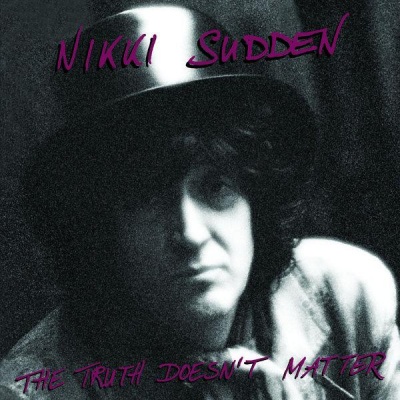
The Truth Doesn't Matter
by Thom Jurek.Recorded in Berlin in 2005 by Phil Freeborn -- with more recording and mixing done by John A. Rivers in England in early 2006 -- the 15 tracks on the Truth Doesn't Matter are the last rock & roll testament of Nikki Sudden, who died in March of 2006. Sudden, who produced these tracks (they're the most polished sessions he ever played on), leaves us as a man who relished the loose yet tough approach of the early Rolling Stones and the Faces, and wrote songs close to the heart and bone of life. That said, it's a little unsettling to hear the synth drum accompanied by a disco bassline and an amplified harmonium that are the spine of "Seven Miles," the opening cut. With multi-tracked backing vocals by Elisabeth Wood, and gritty electric guitars by Sudden and Darrel Bath, it remains a quintessential Sudden number, but who knows whether or not it is a send-up? It's got the short lines, the chunky chords, and the tenderness in the lyrics reminiscent of his best work.Thankfully, though, the rest of the disc doesn't follow in its footsteps. It really kicks off with "Don't Break My Soul," a freewheeling, looser-than-loose garage rock anthem. With Einar Stenseng's Hammond B-3 work, and the two guitars hammering out the riff, it's got the pathos, drama, and rave-up instability that was Sudden's trademark. When it comes to "The Ballad of Johnny and Marianne," it is the Sudden of the Jacobites who presides over this rock & roll fable. Here, Phil Spector, Jack Nitszche, and Sudden all meet and entwine. The former two spiritually, of course, but Sudden grew up on the girl groups and his take on them is as beautiful as it is soulful. With a Mellotron, a Hammond organ, a glockenspiel, and Sanni Baumgärtner's backing vocals, it's a wasted tribute to the big stories heard on transistor radios at night in the '60s. If anything, the song also underlines something else that's prevalent in Sudden's rock mythos: the place of memory as both bitter and sweet in songwriting. His "Green Shield Stamps" offers the story of his and his late brother's growing up Solihull in the early '60s and moving through the Faces, the Arrows, and the glam rock of the early '70s. Being followed by the appropriately named "Jet Star Groove," a grungey mid-tempo ballad, the record is in full gear now, letting Sudden and his soft soul, tragic, fragile persona, and gritty six-string give vent to all those things he's sung about a thousand times before one more go.Fans of Nikki Sudden are bound to be delighted by this collection of new songs. "Empire Blues," "Gin Palace," and "Draggin' Me Down" all crunch to varying degrees, with up- or mid-tempo, Sudden falling in with his guitar and vocals just ahead or behind the beat, and it all feels right. "The Price of Nails" is a lonesome, dire, acoustic guitar and mandola ballad that could have come from a Clint Eastwood Western were it shot in the Australian outback. The throbbing feedback and distortion drenched "Black Tar" -- a paean to heroin -- is heartbreaking for all its truth. The final lyric track, "Beyond Hope," is a broken heart rock & roll ballad from the pale. His dejected Romeo is at the very edge of desperation; the slowly trudging, distorted guitars are his only means of pouring it out and he does so with metaphors -- distinctly British ones -- worthy of Bob Dylan in the mid-'60s, and an attack worthy of Keith Richards circa 1974. The disc ends on the instrumental "All This Buttoning and Unbuttoning," a moving little ballad done acoustically that is faltering at every step on each of the instruments that perform it -- Sudden's piano, with a melodica, slide (and strummed ) acoustic guitars, and a bass that never finds its way at all. It whispers into the void all the unrealized wishes of our tragic hero. This is one for the ages and it's the best Nikki Sudden record we'll get from here on. Thankfully, it's a good 'un.
